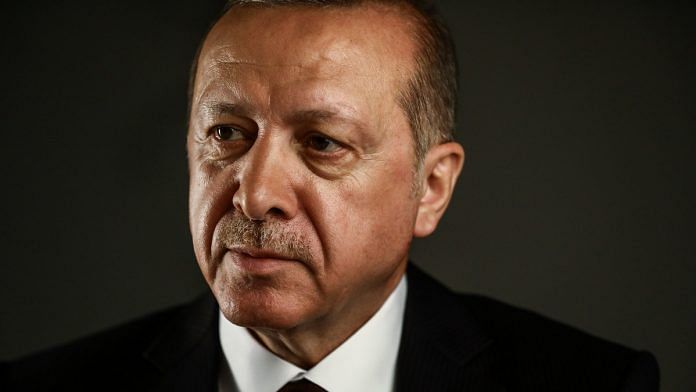Erdogan fires top central bank official and loses mayoral election
Under President Recep Tayyip Erdogan, Turkey has increasingly shifted towards authoritarianism in the past few years. In 2017, Erdogan pushed for a constitutional referendum which allowed him to consolidate unprecedented power in the president’s office. More recently, he fired Turkey’s Central Bank governor Murat Cetinkaya and after his party lost the Istanbul mayoral election, he forced a re-election. But Erdogan’s Justice and Development party (AKP) again lost it.
Since then, there has been increasing frustration within the party’s rank and file about Erdogan’s concentration of power and the nation’s deteriorating economy.
ThePrint looks at Turkey’s shift to authoritarianism and how its political system is trying to resist it.
Kemal’s republic
Any analysis of the Turkish state has to begin by looking at its founder Mustafa Kemal Ataturk. One can then understand how the roots of Erdogan’s authoritarianism can be traced to Kemal.
After the end of the Ottoman Empire, Kemal established the Turkish state in 1923. He took the title of Ataturk – “father of all Turks” and aimed to establish a modern republic.
He dismissed the Ottoman-era idea of pan-Islamism and replaced it with Turkish national pride. Completely disbanded the old religious institutions and Europeanised the state’s legal system.
The new Turkish state had inherited a lot of institutional memory, but Kemal decided to take Turkey in a different direction – a new Europe-like modern state.
“Atatürk opted to lead his country toward a stability based on modernity, openness, education, secularism and democracy, even if he used distinctly undemocratic means to do it,” writes political scientist Ian Bremmer.
Thus, during his rule from 1923 to 1938, Turkey gradually became a democratic republic with political rights, free education and rights for women. But he often did so by passing laws through decree and getting rid of inconvenient opposition.
Role of the military
Bremmer writes that “Kemalism” has been the central tenet of Turkey since the death of Kemal in 1938. And Kemalism underlines two principles: “strict adherence to the secularism of the republic” and “protection of territorial integrity”.
After Kemal’s death in 1938, the army appointed itself as an institution responsible for ensuring that the two principles of Kemalism are always followed.
For a large part of Turkey’s post-1938 history, the army-dominated National Security Council has been the most powerful decision-making body of the country. Often, when the civilian leaders did not adhere to principles of Kemalism, the army has stepped in to replace the government.
This resulted in four military coups, the last being in 1998.
Also read: Old friend Turkey parrots Pakistan line on J&K, says very worried about human rights there
Erdogan’s republic
Erdogan was elected as the prime minister in 2003 and accepted a democratic and moderate agenda. Back then, his critics had argued that this was just a “strategic disguise”, so that Erdogan could eventually unleash his Sunni Islamic agenda.
These points of criticism were not completely unfounded.
When Erdogan became the mayor of Istanbul in 1994, in defiance of Kemalism, he recited verses from the Quran during his first city council meeting. He would go on to declare himself as the ‘imam” of the city and banned public consumption of alcohol.
Though for a couple of terms after becoming the prime minister, he practiced a moderate governance agenda and adopted market-friendly economic policies.
In addition, he really facilitated a series of reforms, which were pre-requisites for Turkey’s admission into the European Union.
But with the Arab Spring in 2011 and severe reconfiguration of the region’s geopolitics, Erdogan eventually began to unleash his Islamic and authoritarian agenda.
Suddenly, Erdogan had to come to terms with a civil war in Syria and increasingly hostile relations with the Kurdish population.
Rise of authoritarianism and the early stages of a democratic backlash
When Erdogan lost his parliamentary majority in the 2015 elections, he maneuvered to call new elections later that year. By then, Erdogan was already suppressing media freedom and undermining his political opposition.
In 2016, a section of the army saw as its duty to unseat Erdogan and “save the republic”. This led to a failed coup – which provided further context for Erdogan to unleash an even harsher authoritarian agenda and centralisation of powers.
“Mass purges swept through the police, the army, the judiciary, the universities, the entire civil service, and the opposition parties, condemning tens of thousands of people and their families to social death, deprived of their papers and their jobs,” notes a report by the Graduate Institute of Geneva.
Soon after Erdogan fought for the president’s office and won the election. Eventually a constitutional referendum was held in 2017, which led to the concentration of powers in the president’s office. He had effectively turned Turkey back to its authoritarian past.
In the recent past there have been two major sources of opposition to Erdogan’s authoritarian turn.
Primarily, there has been an electoral backlash. Erdogan’s AKP lost elections across Ankara, Istanbul and a string of other important cities. Retaining power in these cities was integral to Erdogan and his party’s political dominance.
A more secondary opposition seems to be emerging from the disillusioned leaders and members of Erdogan’s own party. Leaders, such as AKP co-founders Abdullah Gul and Ali Babacan, Osman Can have already left the party. These leaders are expected to launch a new party or a broad-based movement in opposition to Erdogan.
Also read: Turkey willing to mediate between ‘friends’ India and Pakistan, says envoy Sakir Ozkan Torunlar



